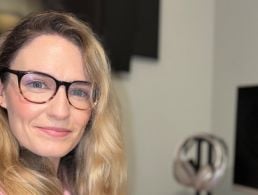Ever wanted to make a dramatic career change? Fidelity Investments’ Kieran Flesk made the leap from plumbing to software engineering.
When it comes to where you end up in your working life, there are probably a hundred different paths that could have taken you there.
This can be particularly true for the world of tech careers. Technology evolves so fast that more and more people are making the career change to get into the industry from diverse backgrounds.
One such person is Kieran Flesk, who came from a background in plumbing and is now a software engineer in Fidelity Investments’ Galway office.
While he joined the Fidelity Investments team straight from college via the company’s graduate programme, he admits he was a late joiner to the tech industry.
“Before pursuing a career in tech, I was a qualified plumber and worked for more than 10 years in the construction industry for my brother in his business.” Flesk was able to return to college part-time while working as a plumber and completed a master’s in software design and development.
“Truth be told, I had little or no knowledge as regards what it took to become a software engineer or what it would take to complete a master’s, but what I knew I had was a real passion for the area,” he said.
With more than a decade working in the construction industry, Flesk could see things slowing down before the recession took hold completely. “I remember sitting in a café in Enniskillen mid-2008 watching the leader of our country announce his retirement. I was in college with 20 other plumbers for my final plumbing exams and I was the exception to the rule when it came to having a job to return to,” he said.
“That day, I realised the need to take stock and to think about not just the here and now but the next 10 or 20 years and what lay in store; what did I want to do?”
After taking stock of his options, Flesk realised that the only job that he would be happy to do in the future was software development.
Constructing software instead of houses
When making the dramatic career change, he was naturally worried. “Naively, the perception I had was one where I needed to learn a whole new skillset. In hindsight, having gone through the experience, coming from the industry I did gave me a huge head start,” he said.
Flesk said that before a pipe was ever laid in a new building, he would always need to elicit requirements from the customer. Beyond that, every plumbing system is designed and developed in a modular fashion with future maintenance and upgrades in mind. Testing and test-driven development are key when it comes to plumbing any building.
Flesk found the same principles and skills applied to building software. “At the end of the day, I’m still in the construction industry – just now I construct software, not houses.”
Switching careers? Take your time
Flesk said making that career change was one of the only times in his life where he really took his time in making a decision, and he advised anyone on a similar wavelength to do the same.
“I looked at every possible option available to me and even some options that didn’t look like they were available to me,” he said.
“I took a significant amount of time to weigh them up and, by taking that time, I found paths and opportunities I never knew existed.”
He said those in a similar position should also take the time to find the right company. Just because you’re new to the industry, it doesn’t mean you have to take the first job you’re offered.
“For me, I couldn’t buy the teaching and experience I gained when I joined the technology graduate programme at Fidelity, and that will bode me in good stead for the rest of my career, wherever that takes me.”
Finally, Flesk advised those thinking of making a career change to reach out to people for help. “I know it sounds simple, but you’d be surprised how much people want to help,” he said.
“I contacted people I never knew, complete strangers, ranging from university lecturers [to] experts in the field of their particular technology, software engineers and many more, either to get their advice or experience, and that played a huge part in what I would see as a successful outcome for me.”




